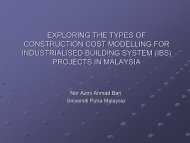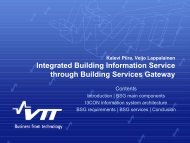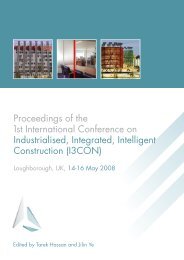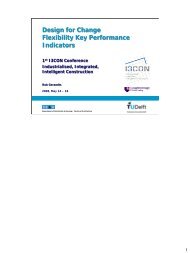Industrialised, Integrated, Intelligent sustainable Construction - I3con
Industrialised, Integrated, Intelligent sustainable Construction - I3con
Industrialised, Integrated, Intelligent sustainable Construction - I3con
Create successful ePaper yourself
Turn your PDF publications into a flip-book with our unique Google optimized e-Paper software.
SUSTAINABLE CONSTRUCTION HANDBOOK 2<br />
engineering, should pay a profound of attention to basic concepts that are needed for process<br />
innovation in construction, or more specifically, for industrialized, integrated and intelligent<br />
construction. Furthermore, innovation potential and creative thinking must be stimulated, not only in<br />
the technological context, but also in the process context.<br />
This chapter discusses the way the section Design & <strong>Construction</strong> Processes, at the Delft University<br />
of Technology, Faculty of Civil Engineering, is trying to realize this, i.e. trying to educate<br />
construction professionals who are aware of the concepts of industrialized, integrated and intelligent<br />
construction, who are innovation-minded and creative thinkers who can help construction companies<br />
and organisations with their necessary innovation processes.<br />
80<br />
Objectives<br />
The objective that this chapter addresses is to identify how to prepare students for their future role as a<br />
construction professional who is not only a valuable designer, engineer or construction manager, but<br />
who is also able to initiate and lead future innovations in the context of industrialized, integrated and<br />
intelligent construction. In short: this chapter addresses the question how students must be educated in<br />
order to prepare them for their role as construction professionals in a <strong>sustainable</strong> society.<br />
Background<br />
The context of the work presented here is the Civil Engineering study, as offered by the Faculty of<br />
Civil Engineering and Geosciences (CiTG) at Delft University of Technology (2009).<br />
The Civil Engineering study is structured as follows. In the BSc stage there is a three year study<br />
programme in which mainly basic subjects are taught, including mathematics, mechanics, design<br />
projects and general theory of construction. Furthermore, students are introduced into the main<br />
specialist fields of the faculty: Water, <strong>Construction</strong>, Transport and Earth. In the first half of the third<br />
year, students can choose a minor program in an area of their interest. Apart from this minor program,<br />
there are few possibilities for elective courses in the BSc program.<br />
In the MSc stage, students choose a specialization track and must follow a two-year program of that<br />
specialization. Examples of MSc specializations at civil engineering are Hydraulic Engineering,<br />
Water Management, Building Engineering, Structural Engineering, and Transport & Planning. In<br />
addition, there are some inter-faculty or cross-faculty specializations, for example <strong>Construction</strong><br />
Management and Engineering and Offshore Engineering.<br />
In practice, this broad BSc curriculum is characterized by an emphasis on fundamentals, especially<br />
mathematics, and on “hardcore” engineering courses such as mechanics, structural dynamics,<br />
hydraulic engineering etc. The MSc stage is much more specialized and the character of this stage is<br />
highly dependent on the chosen specialization.<br />
However, students need to learn more than hardcore engineering courses in order to become valuable<br />
engineers. Students also need to learn design skills, management skills and ICT skills. Probably more<br />
significantly, they need to develop an innovative and creative attitude towards the engineering<br />
profession. This chapter discusses how our group tries to develop these skills and attitude for our<br />
students, within the limitations of the curriculum.<br />
Vision<br />
The main motivation for curriculum development by our group is formed by the needs of the<br />
construction industry for adapting to inevitable changes required by transitions in the BC industry.<br />
According to our own observation, the success of construction projects usually does not depend on<br />
technical or technological factors, but on human and organizational factors. Therefore students should<br />
be educated as engineers who not only can solve difficult technical problems, but who are also able to<br />
cope with the human and organizational aspects of construction – now and in the future based on this<br />
transition of the Dutch BC industry (Table 1).






